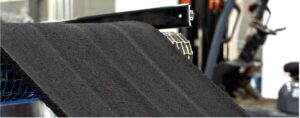Tire-to-Tire Recycling
Partnerships with two tire makers advance the use of recycled rubber
Canadian tire derived product manufacturer Tyromer said that its recycled rubber material, produced through non-chemical extruder devulcanization of end-of-life tire rubber, is now being used by Continental Tire in the production of new tires.
This is the result of a multi-year collaboration driven by the shared commitment of the two companies to a circular economy in which end-of-life tire rubber is reused in the production of new tires. Tire-to-Tire recycling represents in many cases the most direct and energy efficient way to reuse end-of-life tires, the companies said.
“Our collaboration with Continental Tires has taught us lessons in quality, reliability, and consistency, among many others. We are grateful for the support and the guidance to tailor the specifications of our recycled rubber material according to Continental’s specific needs,” Dr. Sam Visaisouk, Tyromer CEO, said.
 Using TDP to replace virgin rubber compounds in new tires will provide more than 90 percent CO2 emission reduction and account for more than half of the lifecycle CO2 emission of a tire overall.
Using TDP to replace virgin rubber compounds in new tires will provide more than 90 percent CO2 emission reduction and account for more than half of the lifecycle CO2 emission of a tire overall.
“Tyromer is a trusted partner of ours supplying recycled rubber material. At Continental, we focus on technologies that generate high-quality feedstock derived from end-of-life tires to produce new tires. Our goal is to gradually use 100 percent sustainably produced materials in our tire products by 2050 at the latest,” Dr. Andreas Topp, Continental’s Head of Materials. Process Development and Industrialization, said.
A second tire manufacturer, India-based Apollo Tyres has also announced a recent partnership with Tyromer to supply tire-derived rubber materials for production of new tires.
“This partnership with Tyromer is a step towards achieving our sustainability and circular economy goals,” PK Mohamed, chief advisor R&D, Apollo Tyres, said.
According to Apollo, using a ton of tire-derived polymers (TDP) can save greenhouse gas emissions equivalent to four passenger vehicles driven for a year and requires less than 2 MWh of energy, compared to over 20 MWh required for the manufacture of virgin materials.
© Scrap Tire News, December 2022






